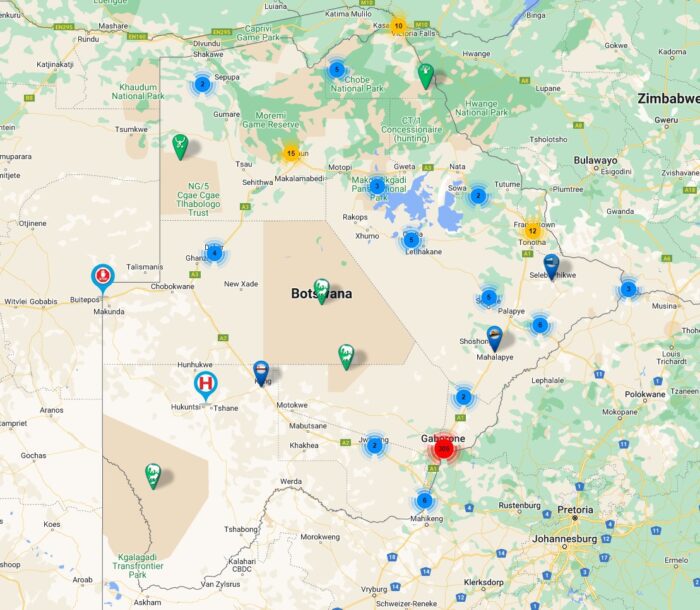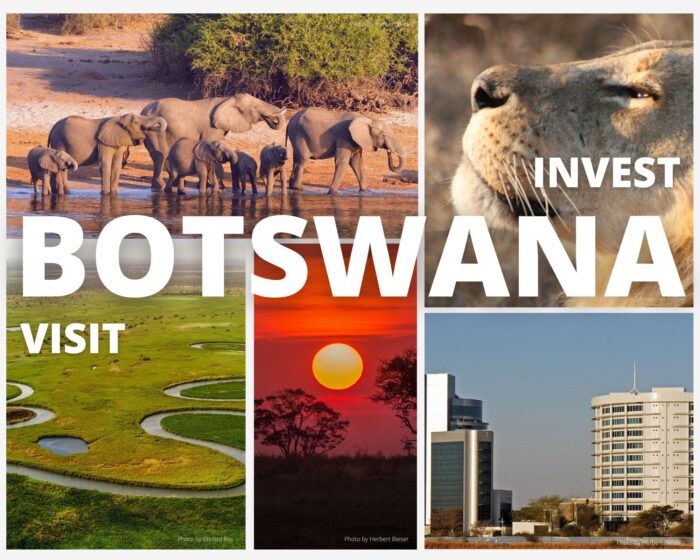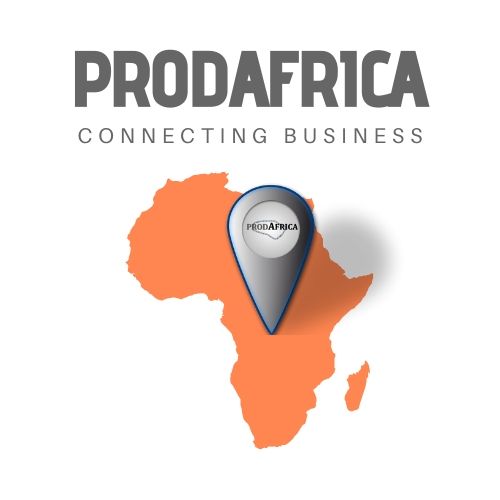Botswana is a landlocked country in southern Africa known for its diamond mines, wildlife reserves, and vibrant culture. But beyond the tourism industry and natural resources, Botswana has developed into an economic jewel in Africa. In this article, we will explore how Botswana has emerged as one of the most prosperous countries on the continent through its economy, society, and governance.

I. Economy
Botswana’s economy is driven by diamond mining, which accounts for roughly 70% of the country’s export revenue. The government has been successful in using the revenues generated from the diamond industry to diversify the economy and invest in infrastructure, health, education, and social programs. As a result, Botswana has experienced a steady economic growth rate of approximately 4% per year.
Botswana has also implemented policies that promote foreign investment and private sector development. The government has created a favorable business environment by reducing red tape and offering tax incentives to foreign investors. According to the World Bank’s Ease of Doing Business Report, Botswana is ranked as the second easiest country in Africa to do business.
Botswana has made significant progress in improving the living standards of its citizens. The country has a low unemployment rate of 8.7%, and poverty levels have decreased from 30% in 2002 to 16.3% in 2015. Botswana has also invested heavily in health and education, resulting in high literacy rates and a life expectancy of 66 years.
- Diamond Mining: Botswana’s main source of revenue
- Diamond mining accounts for approximately 70% of the country’s export revenue.
- Botswana has managed its diamond resources well by partnering with De Beers, the world’s largest diamond company, to establish the Diamond Trading Company Botswana (DTCB). This partnership has resulted in a stable and well-managed diamond industry that benefits both the government and private sector.
- Economic Diversification: Reducing reliance on diamonds
- Botswana has implemented policies to diversify its economy beyond diamonds to reduce its reliance on this finite resource.
- The country has invested in the tourism industry, manufacturing, and agriculture. For example, the government has established Special Economic Zones (SEZs) to attract investment in these industries.
- Investment in Infrastructure: Building for the future
- Botswana has invested heavily in infrastructure development, particularly in the areas of transportation and energy.
- The country has a well-developed road network and a modern telecommunications system. The government has also invested in renewable energy sources such as solar and wind power.
II. Society
Botswana is known for its peaceful and stable society. The country has a strong sense of national identity and has managed to maintain ethnic harmony despite having a diverse population. Botswana is home to various ethnic groups, with the Tswana being the largest group, accounting for approximately 80% of the population.
Botswana has also made significant progress in addressing gender inequality. The country has implemented policies that promote women’s participation in politics and the workforce. As a result, Botswana ranks 6th in Africa in the World Economic Forum’s Gender Gap Report.
Botswana has a well-developed social welfare system that provides assistance to vulnerable groups such as the elderly, children, and people with disabilities. The government has also implemented policies that promote community participation in social programs.
- Social Programs: Investing in the well-being of citizens
- Botswana has used revenues generated from diamond mining to invest in social programs such as health and education.
- The country has a well-developed social welfare system that provides assistance to vulnerable groups.
- Botswana has also implemented policies that promote community participation in social programs.
- Gender Equality: Empowering women
- Botswana has implemented policies that promote women’s participation in politics and the workforce.
- Women in Botswana have equal legal rights, and the government has established programs to promote women’s entrepreneurship and access to credit.
- As a result, the country ranks 6th in Africa in the World Economic Forum’s Gender Gap Report.
- Cultural Heritage: Celebrating diversity
- Botswana has a rich cultural heritage that is celebrated through various cultural festivals and events.
- The government has established the National Museum and Art Gallery to preserve and showcase the country’s cultural heritage.
III. Governance
Botswana has a stable and democratic government that is committed to good governance. The country has a transparent legal system and an independent judiciary that upholds the rule of law. Botswana is ranked as the least corrupt country in Africa by Transparency International’s Corruption Perceptions Index.
Botswana has also made significant progress in promoting human rights. The country has implemented policies that protect the rights of its citizens, including freedom of expression, freedom of assembly, and freedom of the press.
The government has invested heavily in infrastructure development, particularly in the areas of transportation and energy. Botswana has a well-developed road network and a modern telecommunications system. The government has also invested in renewable energy sources such as solar and wind power.
- Democratic Government: A stable and transparent political system
- Botswana has a stable and democratic government committed to good governance.
- The country has a transparent legal system and an independent judiciary that upholds the rule of law.
- Botswana is ranked as the least corrupt country in Africa by Transparency International’s Corruption Perceptions Index.
- Investment in Human Capital: Education and Training
- The government has invested in education and training programs to build a skilled workforce.
- Botswana has a high literacy rate of 88%, and the country has established vocational training centers and scholarships for students to pursue higher education.
- International Relations: A regional leader
- Botswana has established strong diplomatic relations with other African countries and is a leader in the region.
- The country is a member of the Southern African Development Community (SADC) and has played a key role in promoting regional integration and economic cooperation.

Botswana has emerged as one of the most prosperous countries in Africa through its commitment to economic diversification, social programs, and good governance. The country’s success is due to its stable political system, transparent legal system, and sound economic policies. Botswana has invested heavily in infrastructure, education, and training, which has built a skilled workforce that drives the country’s economic growth.
Tables info
Table 1: Economy Details
| Indicator | Value |
|---|---|
| Gross Domestic Product (GDP) | USD 18.45 billion (2020) |
| GDP per capita | USD 7,963.45 (2020) |
| Inflation rate | 2.5% (2020) |
| Unemployment rate | 20.0% (Q2 2021) |
| Main industries | Diamond mining, tourism, beef production, financial services |
| Export partners | European Union, South Africa, Japan, Zimbabwe, Namibia |
Table 2: Society Details
| Indicator | Value |
|---|---|
| Population | 2.38 million (2021) |
| Life expectancy | 68.1 years (2020) |
| Literacy rate | 87.7% (2018) |
| Human Development Index (HDI) | 0.717 (2020) |
| Ethnic groups | Tswana (79%), Kalanga (11%), Basarwa (3%), other (7%) |
| Languages | English (official), Setswana (national), Kalanga, Sekgalagadi, others |
Table 3: Governance Details
| Indicator | Value |
|---|---|
| Type of government | Parliamentary republic |
| President | Mokgweetsi Masisi |
| National Assembly | 63 seats, elected every 5 years |
| Judiciary | High Court, Court of Appeal, Industrial Court |
| Corruption Perception Index | 54/100 (2021) |
| Press Freedom Index | 36/180 (2021) |
Table 4: Education Details
| Indicator | Value |
|---|---|
| Literacy rate | 87.7% (2018) |
| Primary school enrollment rate | 99.3% (2018) |
| Secondary school enrollment rate | 62.5% (2018) |
| Number of universities | 4 (University of Botswana, Botswana International University of Science and Technology, Botho University, Limkokwing University of Creative Technology) |
| Education expenditure | 8.2% of GDP (2018) |
| Adult education programs | Yes, including literacy programs and vocational training |
Table 5: Nature and Wildlife Details
| Indicator | Value |
|---|---|
| Total protected areas | 17.7% of land area (includes national parks, game reserves, and wildlife management areas) |
| Main national parks | Chobe, Moremi, Nxai Pan, Central Kalahari Game Reserve |
| Number of mammal species | Over 160, including elephants, lions, leopards, cheetahs, giraffes, zebras, and hyenas |
| Bird species | Over 500, including African fish eagles, secretary birds, and kori bustards |
| Endangered species | Black and white rhinoceros, African wild dog, brown hyena, Wattled crane, Cape vulture, and others |
| Tourism activities | Game drives, boat cruises, walking safaris, birdwatching, camping, and more |
Table 6: Economic Relations Details
| Indicator | Value |
|---|---|
| Total exports | USD 5.47 billion (2020) |
| Total imports | USD 5.18 billion (2020) |
| Main export partners | European Union, South Africa, China, Zimbabwe, Namibia |
| Main import partners | South Africa, European Union, China, United States, India |
| Foreign direct investment | USD 45 million (2020) |
| Trade agreements | Southern African Customs Union (SACU), Common Market for Eastern and Southern Africa (COMESA), African Continental Free Trade Area (AfCFTA) |
| Major US exports to Botswana | Machinery, vehicles, aircraft, medical equipment, and agricultural products |
| Major Chinese exports to Botswana | Machinery, vehicles, textiles, and electronics |
| Major EU exports to Botswana | Machinery, vehicles, and chemicals |
| Major African exports to Botswana | Diamonds, copper, and beef |
| Major rest of the world exports to Botswana | Petroleum products, chemicals, and textiles |

Team ProdAfrica
team@prodafric.acom